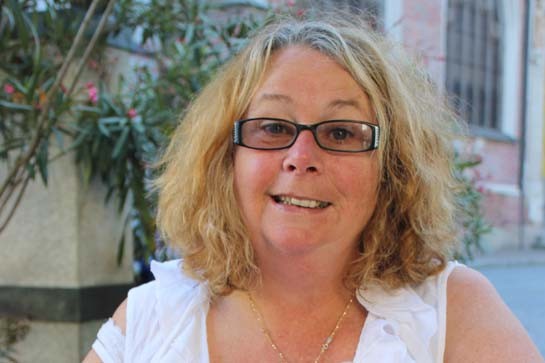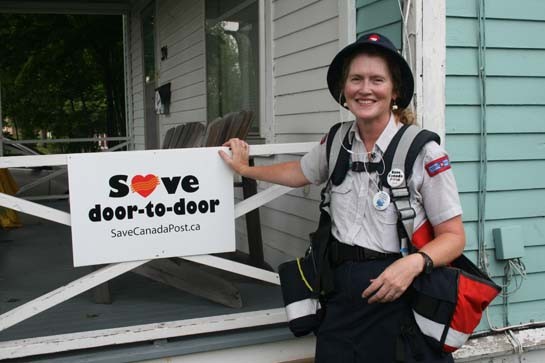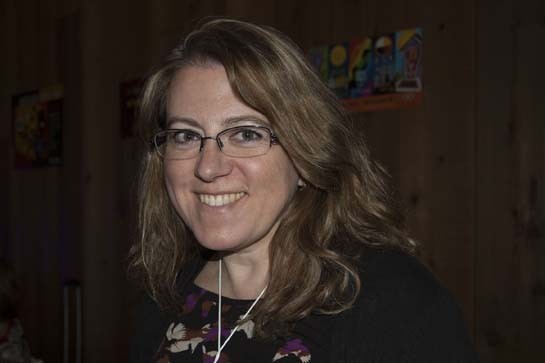Dru Oja Jay has never worked for Canada Post. He confesses to not realizing the full scope of its roles in the community when he started in his position with Friends of Public Services (FPS) just over a year ago. "I'm part of a generation [he's in his early 30s] where I was initially skeptical about Canada Post being an important service. I mean, I had a great respect for postal workers but I didn't necessarily see the mail as a central part of my life. But when you think about what Canada Post actually is — it's not just letters and stamps, but the biggest logistics and marketing network in the country. It reaches every Canadian household."
That's why the Canadian Union of Postal Workers (CUPW), the Canadian Postmasters and Assistants Association (CPAA), the BC Government and Service Employees' Union (BCGEU), ACORN Canada, Friends of Public Services, and the people behind the ecology-oriented Leap Manifesto and Smart Change anti-austerity campaigns rolled out the Delivering Community Power (DCP) initiative.
LEAP TO SUSTAINABILTY
Fittingly launched on February 29, "Leap Day" 2016, the new plan was designed to reconfigure the postmodern post office with an eye toward sustainability. The concept behind DCP could be called a hybrid: maintaining traditional services like door-to-door mail delivery and post offices, even in rural and remote areas, while introducing green technology and valuable community projects at each post office site.
Friends of Public Services has been leading the drive to rally support for the new vision, in the face of continued attempts by Canada Post's management to cut jobs, close post offices, and reduce services. "The way that we're involved has to do more around the packaging and the campaigning of it," clarifies Jay. "We're not a union; we're basically a public organization that works in conjunction with various community partners and our members to advocate for public services."
The unionized jobs at the crown corporation are essential to the socioeconomic fabric of the country, stresses the FPS executive director. "Public services are one of the best ways to redistribute wealth that we have in this country. By taxing corporate profits, and then spending that money to improve the quality of life in Canada by creating high-quality jobs — that's probably one of the best things we can do."
Eliminating those jobs or outsourcing them to private companies damages more than individual workers' lives: "Canada Post is the biggest single employer in rural Canada, and just a few really high-quality jobs in communities can really hold a whole community together."
HARPER APPOINTEES BLOCK PROGRESS
What stands in the way of adopting a new vision for Canada Post? For one thing, the crown corporation "is still run by Harper appointees; the board is full of people who fundraised for Stephen Harper — his personal friends, basically, so they're not going to budge anytime soon," offers Jay. Cuts to home mail delivery and Canada Post jobs in favour of so-called community mailboxes during CEO Deepak Chopra's tenure led to thousands of people writing letters and calling their MPs in protest. "As a result, 5,000 quality jobs were saved across the country, which is a massive victory for the labour movement," says Jay, "and for those communities as well."
Chopra, it should be remembered, was asked to resign his post when Justin Trudeau became Prime Minister; the Canada Post president and CEO refused. "So I think the mandate to help change Canada Post is going to have to come from the Liberals, and we know the Liberals don't do anything unless we force them to," continues the FPS executive director. "They've broken a lot of promises already and they're wavering on a lot of other ones. We have to keep the pressure on and change the game."

PHOTOGRAPH: ROSE HA
Megan Whitfield is a postal clerk at Toronto's South Central letter processing plant, in addition to serving as CUPW president for her local for the past two and a half years. "Before that, I was chief shop steward at the plant for six," she adds, accruing 17.5 years in total as a Canada Post worker.
Whitfield says re-imagining the postal service will help reverse the so-called Canada Post transformation that started under former Conservative prime minister Stephen Harper and his appointee Chopra. Rather than being forced to abandon important duties like door-to-door mail delivery (plus informal ones, like checking on vulnerable, socially isolated individuals), she says unionized Canada Post employees would be empowered to do more under the Delivering Community Power program, "to take back what was taken away and also make the post office greener and keep it viable for future generations."
Weaning Canada Post off its reliance on fossil fuels by converting its fleet to electric vehicles and outfitting its buildings with solar panels, while expanding the use of its corporate assets (to offer services ranging from pop-up farmers' markets at post offices, to delivery of groceries and prescriptions for local residents, to postal banking) is energy efficient and will create new revenue streams.
"We have the largest fleet network [of corporate vehicles] in all of Canada," notes Whitfield. "We have more retail outlets, postal outlets, than even Tim Hortons. When you think of our cities, there's a Tim Hortons on almost every corner. So that just tells you how big of a network we really have."
Offering basic financial services within Canada Post outlets, provided by unionized workers who already handle a variety of sales transactions (stamp/envelope/gift item purchases, MoneyGrams, etc.) is a seemingly obvious way to add value to the physical post office in every community.

Dru Oja Jay is an organizer with the Delivering Community Power campagn. PHOTOGRAPH: FOUNDRY PHOTOGRAPHY
Nicola Boone has been campaigning to keep postal service intact for smaller communities such as those she's served over her career. The New Glasgow, Nova Scotia, letter carrier is president of CUPW Local 87 and delivers mail to the town's North End.
"Small communities don't have banks," says Boone, alluding to mounting numbers of commercial bank branch closures across Canada. Dru Oja Jay concurs: "Even though banks made $35 billion in profits last year, about $4 million per hour in profits, they are closing branches in smaller communities across the country," he says. "When communities lose their bank, they're also losing a lot of their local business."
Boone feels Canada Post can provide the remedy: "Other countries have postal banking and it's highly successful. It's their biggest source of income," she says. "My parents grew up in the United Kingdom and they always had a postal bank." As proof, she even has her father's postal bank book from the 1960s.
"We already do student loans within the post office — you have to go there to initiate the process," she notes. And "a lot of lower income citizens don't have bank accounts, so they have to go to the 'cash stores,' where the interest rates are huge. If they had access to an account at the post office, they could cash their cheques there with no fee."
Reintroducing postal banking within existing Canada Post locations is a logical move, she observes — the service was available until a few decades ago.
Megan Whitfield says it took attending Leap Manifesto events and hearing Toronto Liberal MP (and former broadcast journalist) Adam Vaughan speak about the Delivering Community Power campaign to convince her of possibilities like postal banking, and more. "You can hand out literature and you can speak on it, but when you bring it into [personal] reality, it actually makes sense."

Monica Judd is president of CUPW’s Campbell River Local, in BC. PHOTOGRAPH: COURTESY MONICA JUDD
Whitfield says her involvement with the DCP campaign has brought her out to many public forums. She's seen the value of "getting the membership involved in getting the message out there," observing that "sometimes we're good at putting communications out, but actually getting members as well as the public involved and engaged and actually seeing how doable it is" remains critical.
GOOD GREEN JOBS FOR ALL
Unionized workers in Canada's auto manufacturing sector would benefit from the Delivering Community Power plan, argues Whitfield. "People who know about it and who got the information presented are very receptive. It's win-win. What I noticed a couple of months ago though, as it gets popular, you get some pushback as well, because I know there was talk that it might take away jobs, like UNIFOR — 'What about the automakers? It's going to take away some jobs.' It's actually not — it still provides good, unionized jobs, manufacturing jobs."
If post offices provide charging stations for electric vehicles, the enhanced accessibility "might make Canadians want to buy more electric vehicles, which is win-win because that would help our auto industry. Outside of the GTA and major urban centres, there would be these electrical charging stations and then drivers would know they don't have to worry."
She says the savings and sustainability would benefit Canada Post's own fleet too: "Converting all of our vehicles to electric vehicles in turn will save the corporation money, and help our environment."
The time for debating about taking action on ecological conditions is long past, states Dru Oja Jay. "The climate crisis is upon us and it's huge: we're seeing the flooding in Louisiana. I just read today that there were eight 500-year storms in the last year."
Jay is referring to the scientific term for a weather event so severe it historically takes place only every 500 years. When these weather events happen with increasing frequency, it's an ominous sign of increasing climate change. "We saw the fires in Fort McMurray, and that's just going to get worse unless we significantly change the way we do things," he says.
Through the Delivering Community Power model, postal service assets can be dedicated toward environmentally beneficial measures promoting less fossil fuel dependence, thus decreasing the carbon dioxide emissions associated with dangerous climate change.
"We have this huge network that can be used to do anything we like, because it's publicly owned." We can "use it to create a whole new wave of investment in green initiatives," Jay says with enthusiasm.
Whitfield tells Our Times it's vital to avoid accepting a post-Chopra conceptualization of the public service. Changes made during the Stephen Harper years damaged the reputation of the crown corporation and its workers, and have been used to falsely depict it as a faltering white elephant that would be better if privatized.
"At the end of the day, it's Canada Post that has been the one continuing to cut hours so it's not as accessible to the public," she points out. "The union has always said there's nothing wrong with working Monday to Friday, or seven days a week various hours, to be competitive. We've always said that. But Canada Post, you have to wonder — at the time it was looking at privatization, what have you, in the past. Wherever you had a Shoppers go up beside a retail outlet, they have turned around and closed the retail outlet. Even in the latest round of negotiations, they wanted the ability to close all retail outlets and turn them over to Shoppers Drug Mart or some private mom and pop [convenience store], both non-unionized, and continue to reap the benefits!"

Nicola Boone is president of CUPW Local 87, in New Glasgow, Nova Scotia. PHOTOGRAPH: LORRAINE ENDICOTT
Monica Judd works in retail at Canada Post in Campbell River, BC. She's been employed as "everything but manager" over her 23 years with the crown corporation, and now she has an additional position within her union as the DCP campaign coordinator in the Pacific region.
Downsizing is an old-fashioned, ineffective way to keep a business afloat at the expense of quality, and quality jobs; Judd suggests it still gets too much attention as a way to increase profitability at Canada Post. At presstime, she said, "Right now we're in negotiations and the corporation does have a demand — close 493 of what we call 'corporate outlets.' It's a post office that is actually staffed with CUPW employees, as opposed to a franchise in a Shoppers Drug Mart. Currently, in our collective agreement, we have a moratorium on closures."
THE TIME IS RIGHT
The time is right for Delivering Community Power instead. "The Liberals promised a review and to restore door-to-door, because Canada Post was quite an election issue. I think we really contributed to the defeat of Stephen Harper, strongly." Though the review is ongoing, Judd says "it's not as transparent and accessible as we had hoped.
"We believe if we are going to be able to sell these ideas to them, it's going to be through the review process, because then the review process will make a recommendation to the Parliament of Canada and then they'll say, 'Okay, we're going to look at these recommendations' and implement them," explains Judd. But she cites a frustrating lack of clarity around public consultations: "The task force has finished its work and is doing a report; now it's the Parliamentary committee that is actually travelling to communities across the country. It's predominantly men and not very representative."
Judd says it's also difficult to access information about how the process will work. "They only have dates for the eastern provinces; nothing up north, nothing here out west, nothing in the prairies, and they're saying that they're only having one session in British Columbia. That's in Surrey — we don't know the date that's going to happen. We submitted potential witnesses to them but, again, it's not as accessible as we had hoped."
July 31, 2016 was the deadline for submissions to the Canada Post review task force. The formal review process was to be completed by the end of 2016, with Judy Foote, Minister Responsible for Canada Post, expected to have a decision on the task force's recommendations by April 29, 2017. But Judd feels these dates and their relevance have not reached a wide audience: "It's not being very well publicized. I think if it wasn't for us and our union, people wouldn't know anything about it."

Vikki Quoksister, former president of the Yukon Federation of Labour, is a suburban and rural route delivery worker. PHOTOGRAPH: YUKON EMPLOYEES’ UNION
Spreading the word is especially important in regions underserved by internet, and thus more reliant on Canada Post. Vikki Quoksister is a suburban and rural route delivery worker and a member of the Wei Wai Kum First Nation of Campbell River. The former president of the Yukon Federation of Labour supports Delivering Community Power as a potential means of improving local economies and quality of life in geographically remote areas.
"The crown corporations were created to help Canadians have services, so why not expand on that?" she asks rhetorically. "It's funny that we're in this situation where we have a CEO who is just hell-bent on shutting down what we as Canadians deserve and own. It's beyond me how he's given the power to do that."
The post office need not abandon its roots (i.e. letter and parcel mail delivery) in favour of a wholesale shift to new offerings like pop-up stores and car-charging stations either, especially in the Yukon, Nunavut and Northwest Territories. Quoksister observes that physical mail delivery helps everyone from First Nations elders wanting to remain in their own communities, to tourists camping in areas with no electricity or Wi-Fi, to ethical online shoppers hoping to avoid what is sometimes the only "local" retail outlet standing, a Walmart. The private sector is not likely to take on these regions. As she laughingly notes, "FedEx still has to use Canada Post to get delivery done!
"There's no letter carrier that's going to go up to Old Crow. There's no letter carrier that's going to go up to Carcross," adds the proud rural router. "This affects the North specifically, so this would be a wonderful trial in the Yukon. I'd love to see Delivering Community Power implemented here."
The question of what expanded services might cost is important, particularly for Canadians with limited incomes. "Being the post office, we would expect [old and new services] to be affordable," stresses Quoksister. "It wouldn't be out there to make money — it would be out there to break even."
In other words, Canada Post could return to its origins as a public service, rather than a commercial money-maker, under DCP. Not that the crown corporation is losing money anyway, she observes wryly: "If you ever read the financial statements, the only year that they had a bit of a financial loss was the year they went to the new sortation delivery and they bought these zillion-dollar buildings. They also had a lockout, so they blamed it on the lockout. They called it a strike because people have no idea that they aren't the same thing.
"So Canada Post is making a lot of money," emphasizes Quoksister. "Obviously it makes a lot, because its CEO gets paid a lot!"
The third-generation postal worker is strongly critical of Chopra's neglect for Indigenous Canadians. "I don't think that he even considered the First Nation communities," says Quoksister. "We used to have a food mail program through the federal government, and that went right through the post office. We don't have that anymore — now it's 'Nutrition North.'"
Basic grocery prices have skyrocketed under Nutrition North and residents of "fly-in" sites without road access have few other options for food. "[DCP] again is something that could alleviate that, but there needs to be a federal buy-in," she tells Our Times. "The federal government truly needs to address this. I feel that Nutrition North needs to go and the mail program needs to come back. But, in order to do that, we also have to have a post office."
IT'S NOT TOO LATE
Megan Whitfield suggests that it's not too late to show support for Canada Post and Delivering Community Power. "We're hoping that the federal government will be pressured into implementing this," she advises. "The mandate review does finish by late January. The recommendations come out in May 2017." Voicing pro-DCP sentiment to one's local MP is one way she says supporters can protect and improve their postal service. Delivering Community Power even has an option to help create letters to send to media outlets.
In 1867, Royal Mail Canada was established as a government department responsible for deliveries to people across the country. Today, Delivering Community Power is fundamentally about facilitating communication among Canadians. One of Vikki Quoksister's fears is corporate-mindedness squandering Canada Post's historic role in bringing people together. "In my mind, the direction that the post office is going is trying to undermine our communication in some fashion, because we're not fully connected in this country yet and we need to be able to connect like that, unless we go back to what . . . dog sled delivery?" she quips. With only two digital lines serving the territory, internet remains unreliable; a damaged power line in Port Nelson, BC, created a temporary Yukon-wide internet outage in August 2016.
Informing citizens about their own part in Canada Post is crucial. "I don't think people feel public services as being owned by them or owned by communities," shares Dru Oja Jay. "For years we've had this model of public services being run by whatever bureaucrat is appointed by the government in power, usually someone's buddy, and they just do whatever they want. So people feel disempowered about their public services. That's really what we're trying to do: not just saying 'we have to keep the public service in place,' the way it is, but 'let's create a type of ownership where workers and community members together can make decisions about how we use those resources at our disposal.'"
PRIVATIZATION IS NOT THE ANSWER
Privatization and partnerships with private business are poor options for preserving Canada Post's infrastructure, says the Montreal-based friend of public services. "We absolutely don't want Walmart to get on board!" chuckles Jay, using an extreme example to draw attention to a serious concern.
"I don't think corporations are going to do anything except operate in their own interests. I think that if we start building community power, in real tangible ways, by building alliances, and starting to work together to demand these things — if we have First Nations, public sector workers and environmentalists, as well as the broader community, all working together for a common goal, that creates relationships which create the kind of power that we need to force the corporations to pay their fair share."
With the federal Liberals pledging some $20 billion in infrastructure spending, he wonders how much of that will go to public-private partnerships: "If we have charging stations in front of every post office, is that going to be a public-private partnership with SNC Lavalin, or is that going to be a publicly owned piece of infrastructure that the public has control of and gets to use?" Jay asks. "This is the fine print we need to be really vigilant about, which is why we have to build power to make this stuff happen."
Melissa Keith is a former radio broadcaster and an award-winning freelance journalist. She lives in Lower Sackville, Nova Scotia.















